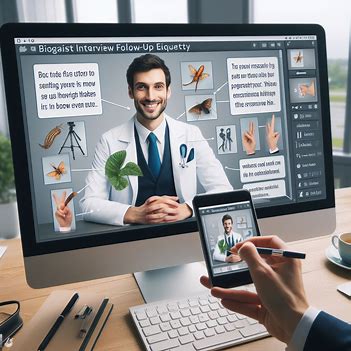Effective Email Communication and Etiquette for Biologists
When applying for biology-related job positions, email communication plays a crucial role in making a positive first impression on potential employers. It is essential to adopt professional email etiquette to ensure your message is clear, concise, and leaves a lasting impact. Here are some tips to help you master the art of effective email communication:
- Use a professional email address: Your email address should reflect your professionalism. Avoid using personal or inappropriate email addresses and opt for a simple format comprising your name, such as john.doe@example.com.
- Write a clear and concise subject line: The subject line should accurately and succinctly summarize the purpose of your email. It helps the recipient understand the importance of your message and increases the likelihood of it being opened and read promptly.
- Start with a proper greeting: Begin your email with a professional greeting, such as “Dear [Recipient’s Name],” or “Hello [Recipient’s Name],” followed by a comma or a colon. Addressing the recipient with courtesy and respect sets the right tone for the conversation.
- Keep your message concise: Ensure your email is clear and to the point. Use short paragraphs and bullet points to break down information effectively. Avoid lengthy sentences and unnecessary details that may confuse or overwhelm the reader.
- Proofread your email: Always proofread your email before hitting the send button. Check for spelling, grammar, and punctuation errors. A well-written and error-free email demonstrates your attention to detail and professionalism.
- Be polite and professional: Maintain a polite and professional tone throughout your email. Remember to use appropriate language, avoid slang or abbreviations, and express yourself respectfully. Avoid using caps lock, as it may come across as shouting.
- Include a professional email signature: Create a signature block at the end of your email that includes your full name, professional title, contact information, and any relevant social media profiles or professional website. A well-designed email signature adds credibility and makes it easy for recipients to reach out to you.
- Respond promptly: When you receive an email, try to respond as soon as possible. Prompt responses show your professionalism and commitment. If you need more time, acknowledge the email and provide an estimated timeframe for your response.
- Use an appropriate closing: End your email with an appropriate closing, such as “Sincerely,” “Best regards,” or “Thank you.” Remember to include your name after the closing to personalize the email.
Mastering effective email communication and practicing proper email etiquette will significantly increase your chances of impressing potential employers and securing biology-related job opportunities. By following these tips, you’ll stand out as a professional and reliable candidate.
Remember, each email you send is an opportunity to make a positive impression, so take the time to craft your messages thoughtfully and professionally.
